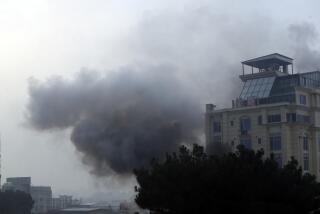Deportation to Syria Backed
- Share via
WASHINGTON — U.S. Atty. Gen. Alberto R. Gonzales said Tuesday that the United States had acted lawfully when it deported a Canadian citizen, Maher Arar, to Syria, where Arar says he was tortured during a yearlong incarceration.
“Mr. Arar was deported under our immigration laws. He was initially detained because his name appeared on terrorist lists, and he was deported according to our laws,” Gonzales told reporters.
Gonzales’ comments came one day after a Canadian commission, headed by Justice Dennis O’Connor, released a three-volume, 1,195-page report excoriating U.S. authorities for sending Arar to Syria even though he had no ties to terrorism.
“American authorities who handled Mr. Arar’s case treated [him] in a most regrettable fashion,” O’Connor wrote. “They removed him to Syria against his wishes and in the face of his statements that he would be tortured if sent there.”
The inaccurate description of Arar, a wireless communications engineer who was born in Syria, and his wife as “Islamic extremist individuals suspected of being linked to the Al Qaeda terrorist movement” came from the Royal Canadian Mounted Police, which also included him in a diagram titled “Bin Laden’s Associates: The Al Qaeda Organization in Ottawa.”
Arar’s name was placed on a terrorist watch list, and he was detained at John F. Kennedy International Airport in September 2002 while returning from a family vacation in Tunisia.
“I am categorically able to say that there is no evidence to indicate that Mr. Arar has committed any offence or that his activities constitute a threat to the security of Canada,” O’Connor wrote in the report, the result of 2 1/2 years of investigation.
The report found that Canadian law enforcement officials had sought to interview Arar during a terrorism investigation because he knew a target of the probe, but they did not consider him a terrorist suspect.
Despite that, the report said, “the RCMP provided American authorities with information about Mr. Arar that was inaccurate, portrayed him in an unfairly negative fashion and overstated his importance in the ... investigation.”
The Canadian government appeared ready to formally protest the U.S. action.
“Mr. Arar has been done a tremendous injustice,” Prime Minister Stephen Harper told the House of Commons on Tuesday.
He said the government would “act swiftly” on the recommendations in O’Connor’s report, one of which was to “register a formal objection with the governments of the United States and Syria concerning their treatment of Mr. Arar and Canadian officials involved with his case.”
The prime minister is to meet with President Bush in New York this week.
Arar, now 36, has said that he was interrogated for several days in New York, was refused access to a lawyer and was eventually sent to Syria. He and his family had moved to Canada when he was a teenager.
“I would like the U.S. government to accept [O’Connor’s] findings and clear my name,” he said in a interview Tuesday in Ottawa, the Canadian capital.
The report from Canada comes at a time of angry debate in Washington over the rules applied to U.S. agents interrogating terrorism suspects. But questions continue about the transfer of prisoners, seized by CIA agents and others, to countries where they are subject to torture. The practice is known as rendition.
Gonzales said Arar’s removal was a deportation and not rendition.
“Even if it were a rendition, we understand as a government what our obligations are with respect to anyone who is rendered by this government to another country, and that is that we seek to satisfy ourselves that they will not be tortured,” he said. “And we do that in every case. And if in fact he had been rendered to Syria, we would have sought those same kind of assurances, as we do in every case.”
Arar challenged that assertion. “I don’t think they are being truthful about this,” he said.
In his case, he said, a “special removal unit” transported him to Syria via Jordan on what he believes to have been a CIA plane. “They rendered me to a country that they consider sponsors terrorism and that has a legacy of torture,” he said.
The CIA had no comment Tuesday.
The Canadian report said Arar was beaten with an electric cable until it shredded. He has said he was beaten repeatedly, and kept in an unlit cell 3 feet wide, 6 feet long and 7 feet high for more than 10 months before he was released.
In addition to refusing to comment on the Arar report, the CIA would not say whether a growing list of mistakes had led it to make any changes in the rendition program.
Ben Wizner, an American Civil Liberties Union lawyer, said the Canadian commission’s report was a cautionary tale for U.S. legislators as they debate interrogation rules.
Wizner is representing Khaled El-Masri, a German citizen who, in a case of mistaken identity, was kidnapped by the CIA and taken to a secret Afghan prison, where he said he was abused. His suit against the CIA was dismissed by a federal court in Virginia after a judge ruled that allowing it to proceed could harm national security.
The Arar and El-Masri cases show that “not every torture victim is a terrorist. Some of them are innocent men,” Wizner said.
Times staff writer Schmitt reported from Washington and Times correspondent Guly from Ottawa, Canada. Times staff writers James Gerstanzang and Greg Miller contributed to this report from Washington
More to Read
Sign up for Essential California
The most important California stories and recommendations in your inbox every morning.
You may occasionally receive promotional content from the Los Angeles Times.










